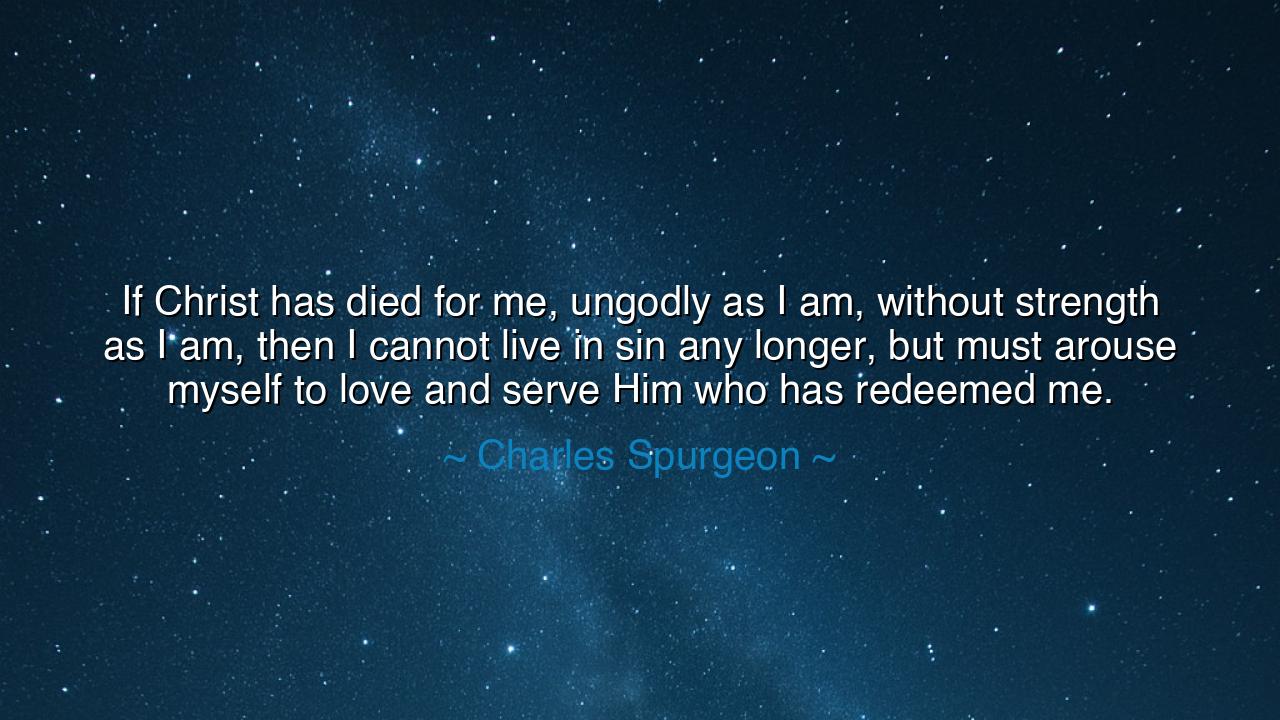
If Christ has died for me, ungodly as I am, without strength as
If Christ has died for me, ungodly as I am, without strength as I am, then I cannot live in sin any longer, but must arouse myself to love and serve Him who has redeemed me.






Hear the words of Charles Spurgeon, the “Prince of Preachers,” who proclaimed with burning conviction: “If Christ has died for me, ungodly as I am, without strength as I am, then I cannot live in sin any longer, but must arouse myself to love and serve Him who has redeemed me.” In this cry lies the essence of Christian devotion: that the sacrifice of Christ is not a distant tale but a personal summons. For if He bore the cross for me—weak, unworthy, rebellious—then how can I remain unmoved? Spurgeon calls us to rise from slumber, to awaken from complacency, to live lives worthy of such redemption.
The origin of this saying is bound to Spurgeon’s preaching in the 19th century, where he spoke to multitudes in London and beyond. His sermons were not abstract but urgent, aimed at piercing hearts dulled by habit. He reminded men and women that they were “without strength,” unable by themselves to conquer sin. Yet Christ, in infinite mercy, died for the ungodly. This staggering gift of grace demanded response—not passive belief, but active love and service. In Spurgeon’s view, to continue in sin after such redemption would be betrayal; to live otherwise was the only fitting gratitude.
History offers us vivid mirrors of this principle. Consider the story of John Newton, once a trader in human souls, hardened by greed and sin. When he encountered the grace of Christ, he was struck to the core: that such mercy could reach even him, a man steeped in cruelty. Newton could not remain in sin after such realization. He devoted his life to preaching the gospel and fighting the very slave trade he once served. From his transformation came the hymn “Amazing Grace,” a song that echoes Spurgeon’s teaching—that redemption calls forth both repentance and service.
The heart of this saying is the paradox of grace: that we are loved not because we are strong or righteous, but because we are weak and sinful. To know this is to be humbled, but also empowered. For when a man realizes that Christ died for him at his lowest, he cannot treat sin lightly. It is no longer a small indulgence; it is an insult to the One who bore his guilt. Thus, Spurgeon’s words are both warning and inspiration: warning against living in sin, and inspiration to rise with strength borrowed from divine love.
There is also here a profound teaching about motivation. Many live morally out of fear of punishment or desire for reputation. But Spurgeon reminds us that the highest motive is love born of gratitude. The Christian does not serve Christ merely because it is commanded, but because the heart overflows with thankfulness. Just as a soldier fights fiercely for the comrade who once saved his life, so too does the redeemed soul serve Christ—not out of duty alone, but from a love that cannot remain still.
Consider also the example of the early martyrs of Rome. These men and women, though weak and powerless before the empire, faced lions and flames with unshaken resolve. Why? Because they believed Christ had died for them, and that His redemption was worth more than their own lives. Their strength was not their own—it was the strength of gratitude and love that made them rise above fear. In them, we see Spurgeon’s words embodied: the redeemed cannot remain passive, but are stirred to heroic devotion.
The lesson for us is clear: if we truly believe we have been redeemed at such a cost, we cannot live carelessly, nor treat sin as trifling. Gratitude must move us to act. Each day is an opportunity to “arouse ourselves”—to shake off apathy, to love deeply, to serve faithfully. Practical action may be as simple as prayer offered with sincerity, kindness extended to a stranger, or courage shown in defending truth. In these ways, we repay not with equal measure— for we cannot—but with lives shaped by gratitude.
Thus, O seeker, remember Spurgeon’s call: Christ died for you—not at your best, but at your weakest. Do not remain in chains when you have been set free. Do not slumber when love itself has awakened you. Rise, therefore, in strength not your own, to love and to serve Him who redeemed you. For this is the path of true discipleship, the path of gratitude, and the path of eternal life.






AAdministratorAdministrator
Welcome, honored guests. Please leave a comment, we will respond soon